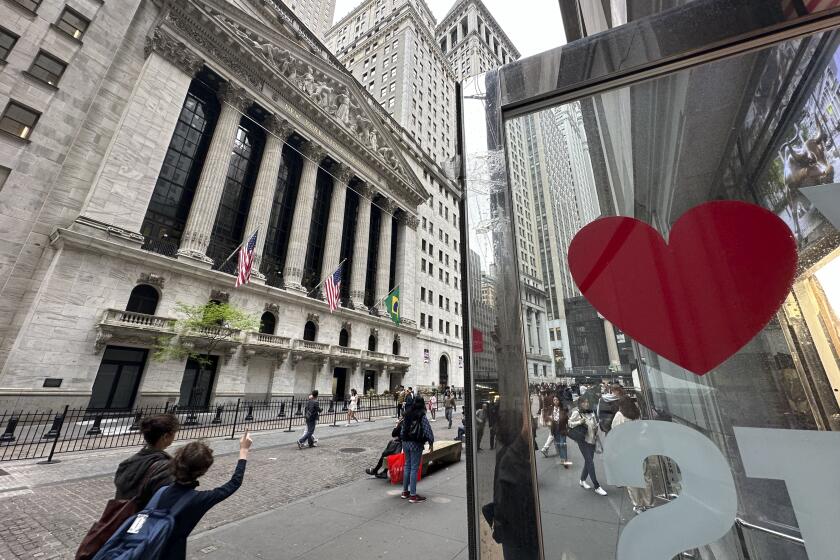Documentaries Ramp Up Debate Over Wal-Mart
Coming to a theater -- or church, college, firehouse or living room -- near you: dueling Wal-Mart movies.
The world’s biggest retailer inspires not only loyalists and foes but also two films with distinctly different takes.
One is sharply critical: Robert Greenwald’s “Wal-Mart: The High Cost of Low Price.” The other is Ron and Robert Galloway’s enthusiastic “Why Wal-Mart Works: And Why That Makes Some People Crazy.”
“The High Cost of Low Price” took a year to produce on a budget of $1.8 million, a pittance by Hollywood standards. The documentary, which premiered this week in New York and Los Angeles, will be shown in free screenings starting Nov. 13 at more than 7,000 churches, schools, cafes, union halls, clubs and other small venues. It also will be available on DVD.
“Why Wal-Mart Works” began as a book about supply-chain management -- certainly a rarity in the annals of cinema -- and grew to become a movie with an even barer-bones budget than its rival’s: $85,000.
The Galloways, who said they rushed their work to print to piggyback on Greenwald’s publicity, will premiere their film Nov. 15 in Wal-Mart’s hometown of Bentonville, Ark., and thereafter offer it on DVD.
Greenwald, a veteran of made-for-TV movies, directed the anti-Fox News documentary “Outfoxed: Rupert Murdoch’s War on Journalism” (2004). The Galloways were behind the 2001 PBS documentary “Oflag 64: A P.O.W. Odyssey.”
As is clear from the titles of the two Wal-Mart films, where they differ most comes down to whether the company plays a negative role in society and, if it does, who is to blame.
“I’d like to see Wal-Mart change its policies,” Greenwald said. “The problems we’re dealing with and expose with individual stories are systemic, and the facts and statistics back that up.”
Ron Galloway agrees on at least one point: “I think the [issues] are systemic -- in a good way,” he said. “I think, for the most part, Wal-Mart works and things are OK, but you do have odd, troubling issues, and I think some of them happen on a local level.”
Greenwald’s film offers personal stories from Wal-Mart employees, Chinese factory workers, small shopkeepers, local politicians and others who painstakingly recount the wrongs they believe have been done to them by the behemoth from Bentonville.
Backed by somber music and shocking text to support Greenwald’s tales of Wal-Mart excesses, store managers describe how they illegally adjusted workers’ time sheets to remove overtime hours. Employees recount being instructed by supervisors to apply for public assistance to supplement their pitiful pay.
Greenwald’s Wal-Mart is obsessed with profit. But in the Galloway brothers’ film, Wal-Mart merely reaps the financial rewards of brilliantly executing a business that tens of millions of Americans can’t live without.
The film features a succession of people in the college town of Boone, N.C., who tell director Ron Galloway their perceptions of Wal-Mart, including concerns about its pay practices, treatment of employees, effect on local businesses and reliance on Chinese imports.
From there, the film presents opinions about the company from what Galloway calls the Ayn Rand school of thought: academics and authors who maintain that Wal-Mart offers unprecedented business efficiencies, opportunities for workers and overall a boon to the economy.
The movie also features Galloway’s interviews with happy and grateful Wal-Mart workers, including one named Sha-Ron, a support manager in Torrance who never had a job or health insurance before a Wal-Mart store manager took a chance on her.
Another, Jessica, a store manager in Waveland, Miss., clothed and fed her town after hurricanes Katrina and Rita. A third interview shows a Minnesota resident who was shocked when Wal-Mart hired her at age 75.
Wal-Mart, in the midst of an aggressive campaign to improve its image, has assailed one film and touted the other, although the company has seen neither of them and, a spokeswoman said, they won’t be sold in Wal-Mart stores.
The filmmakers agree that the pressure being put on Wal-Mart could force the company to change.
In the Galloways’ film, a portfolio manager says criticism could make the retailer stronger.
In Greenwald’s movie, the final scenes are of communities rising up to stop Wal-Mart from coming to their towns.
“Wal-Mart policy is not driven by a particular ideology; it’s driven by making money,” Greenwald said. “If, as is becoming clear to them, their policies, the way they are treating their employees and the way they are treating American families and communities is costing them business, I think they could change.”
With both projects, the filmmakers have put themselves on the line, personally and financially. Greenwald took out loans to raise $600,000 for his documentary; the Galloways selffinanced their entire $85,000 project.
“If I don’t make back my money, my wife kicks me out of my house,” Ron Galloway said. “If [Greenwald] doesn’t make back his money, the bank kicks him out of his house.”
*
(BEGIN TEXT OF INFOBOX)
Rolling credits
*
“Wal-Mart: The High
Cost of Low Price”
Budget:$1.8 million
Director:Robert Greenwald
Starring:Wal-Mart Chief Executive H. Lee Scott Jr. and many unhappy Wal-Mart workers, community
members, factory workers and officials
Shooting days: On and off, 9 months
Info: www.walmartmovie.com
*
“Why Wal-Mart Works:
And Why That Makes
Some People Crazy”
Budget:$85,000
Director:Ron Galloway
Starring: Many happy Wal-Mart workers and community members
Shooting days: 21 days
Info: www.whywalmartworks.com
*
Los Angeles Times
*
Sources: Times research






